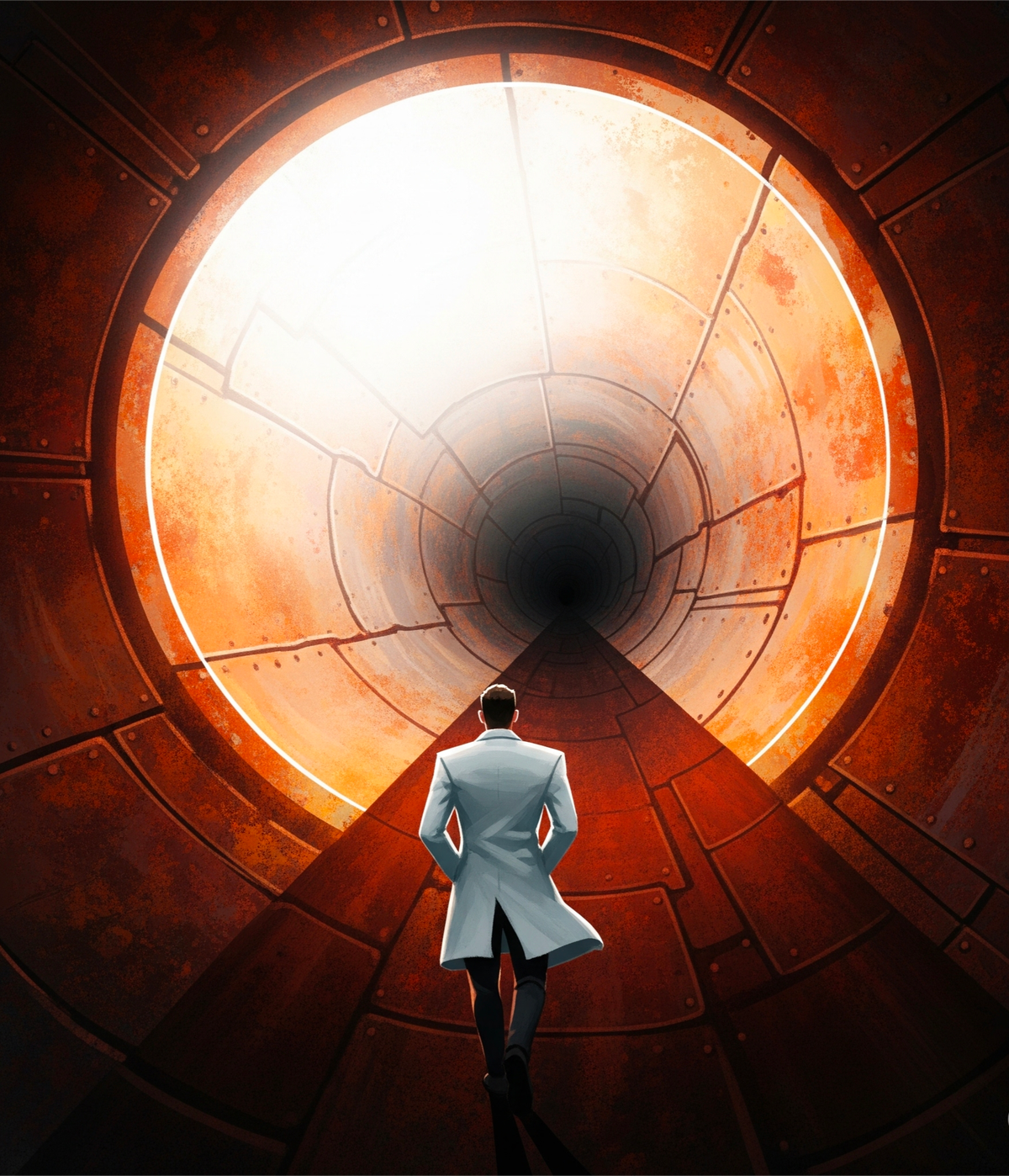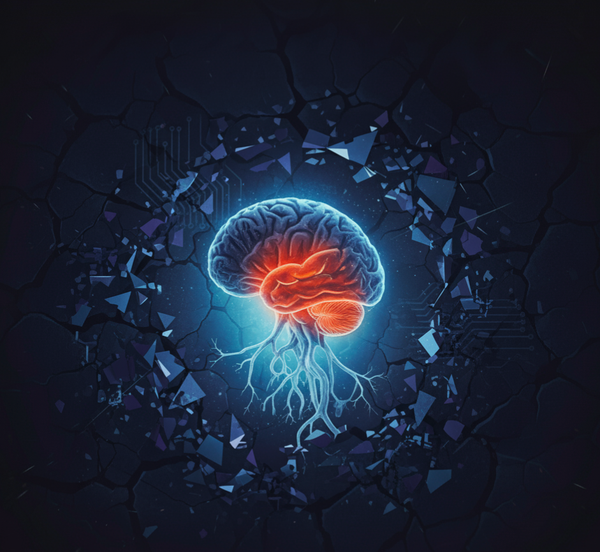From Light to Blindness: How the Enlightenment Lost Its Way

We live in an age of breathtaking technical sophistication and profound existential confusion. We can manipulate matter at the atomic level but can't agree on what makes life worth living. We've mapped the human genome but struggle to understand human nature. We've built global communication networks that somehow fragment rather than unite our understanding of the world.
This isn't an accident—it's the inevitable result of what I call the "tunnel vision trap," a systematic narrowing of intellectual focus that has transformed the Enlightenment's promise of comprehensive rationality into a collection of disconnected specialties that can no longer speak to the deepest questions of human existence.
The Consequences: When Experts Can't See the Forest
The symptoms of this intellectual fragmentation are everywhere. We've created a bizarre cultural logic where technical competence in narrow domains somehow qualifies people for wisdom about comprehensive questions. The AI researcher who optimizes pattern recognition algorithms becomes an authority on consciousness. The financial engineer who perfects high-frequency trading advises governments on human flourishing. The neuroscientist who maps neural correlates pontificates on free will and meaning.
This creates what we might call an "authority gap"—people intuitively sense that something essential is missing from these reductionist accounts, but they're told that questioning them means rejecting science itself. When the neuroscientist reduces love to neurochemistry or the economist treats humans as rational utility-maximizers, these explanations may be technically sophisticated, but they feel profoundly dehumanizing.
The result? A growing distrust not just of specific claims, but of the entire intellectual establishment. We're witnessing the rise of conspiracy theories, religious fundamentalism, and populist anti-expertise movements—not primarily because people have become irrational, but because they're hungry for the kind of comprehensive meaning-making frameworks that our fragmented intellectual culture explicitly refuses to provide.
The Roots: How the Enlightenment Planted Its Own Destruction
To understand how we got here, we need to return to the 18th century and the extraordinary intellectual movement we call the Enlightenment. The philosophes had a revolutionary idea: that reason could serve as a unifying principle capable of illuminating everything from natural philosophy to politics to ethics.
This wasn't narrow technical rationality—it was what we might call "synthetic rationality." Voltaire wrote on physics, history, literature, and political reform. Diderot's Encyclopédie was explicitly designed to show the interconnectedness of all knowledge. Adam Smith was a moral philosopher before he was an economist, and his economic insights emerged from broader reflections on human nature and social organization.
The Enlightenment worked because it maintained comprehensive rational frameworks for understanding the whole of human experience. It combined technical competence with synthetic wisdom, specialized knowledge with broader purpose.
But here's the cruel irony: the very success of Enlightenment methods contained the seeds of their own fragmentation. As rational inquiry proved effective in various domains, it began to subdivide into increasingly specialized fields, each developing its own methods, language, and assumptions.
What Went Wrong: Rationality Eating Itself
The turning point came roughly in the late 19th and early 20th centuries. Instead of comprehensive rational frameworks, we developed disciplinary silos that lost sight of their common foundation. What we got was methodological reductionism that mistook specialized techniques for rationality itself, and technical expertise divorced from philosophical reflection about what the techniques were actually for.
This represents a peculiar tragedy: we didn't abandon the Enlightenment's rational project—we hyper-specialized it to death. What we call "rational" today would have horrified 18th-century philosophers, not because it lacks technical sophistication, but because it lacks synthetic wisdom.
The Enlightenment's original vision of reason as a unifying principle was replaced by what we might call "technical rationalism"—the belief that rationality consists entirely in applying specialized methods within narrow domains. We developed what I call "productive blindness"—the ability to focus intensely on narrow metrics while systematically ignoring broader implications.
Our entire academic and economic system now operates as a vast sorting mechanism that rewards tunnel vision. To succeed in any specialized field, you must learn to optimize within existing frameworks without questioning what's worth optimizing for in the first place.
The Way Out: Recovering the Source
The path forward isn't to reject specialization or return to pre-modern thinking. The various streams of knowledge—science, mathematics, philosophy, art—remain valuable. But we need to recover sight of their common source.
This is where Geneosophy becomes crucial. Rather than asking "How can we create more specialized disciplines?" we need to ask "What is the primordial capacity that makes all these disciplines possible in the first place?"
Think of it this way: instead of endlessly mapping streams at a river's estuary, we need to investigate the source. What is the fundamental creative capacity that manifests in mathematical discovery, scientific insight, artistic creation, and philosophical reflection? What is the primordial capacity for thought, concept formation, and rational inquiry that makes all our specialized knowledge possible?
This isn't about choosing between technical expertise and comprehending its source—it's about recognizing that they need each other. Technical competence without synthetic wisdom leads to the optimization traps we see everywhere: solving narrow problems in ways that create larger problems we can't see because they fall outside our specialized domains.
Contemporary Efforts
Some contemporary thought seeks to transcend disciplinary boundaries in pursuit of a more holistic understanding.
The key difference between these efforts and what Geneosophy proposes is that they still try to synthesize from the various disciplines rather than investigating the primordial source from which all disciplines emerge. They're still essentially mapping streams rather than investigating the river's source, though they're trying to map them in relation to each other rather than in isolation.
What makes Geneosophy unique is its focus on the pre-conceptual creative capacity itself—not just integrating existing forms of knowledge, but investigating the fundamental activity that makes all knowledge possible in the first place.
Toward Integral Rationality
What we need is what we might call "comprehension of the source"— that can accommodate specialized competence. This means:
- Recognizing that all our various forms of knowledge are expressions of the same fundamental creative capacity
- Understanding that reality appears to be inherently knowable—that there's a deep accord between mind and reality that makes rational inquiry possible
When specialists in different fields recognize that they're all investigating different aspects of the same underlying mystery, genuine dialogue becomes possible. The AI researcher and the poet, the physicist and the mystic, the economist and the artist—all are exploring facets of the same creative principle that makes knowledge possible.
Beyond the False Choices
This approach offers a path beyond the sterile oppositions that have trapped contemporary discourse: scientific materialism versus religious spirituality, technical expertise versus human wisdom, objective analysis versus subjective meaning. All of these can be recognized as partial expressions of the more fundamental autonomous creativity that Geneosophy investigates.
The religious fundamentalism and populist revolts we're witnessing aren't primarily rejections of the Enlightenment—they're confused attempts to recover what the Enlightenment originally promised but hyper-specialization destroyed: comprehensive rational frameworks for human flourishing.
The tunnel vision trap isn't inevitable. We can have both technical sophistication and synthetic wisdom, specialized knowledge and broader purpose. But this requires recovering the primordial unity that makes all our various forms of knowledge possible—investigating the source rather than endlessly multiplying the streams.
The question isn't whether we'll continue to advance technically—we will. The question is whether we can recover the comprehensive vision that can give our technical advances meaning, direction, and wisdom. The future of rational civilization may depend on our ability to step back from the streams and rediscover the source from which they all flow.




